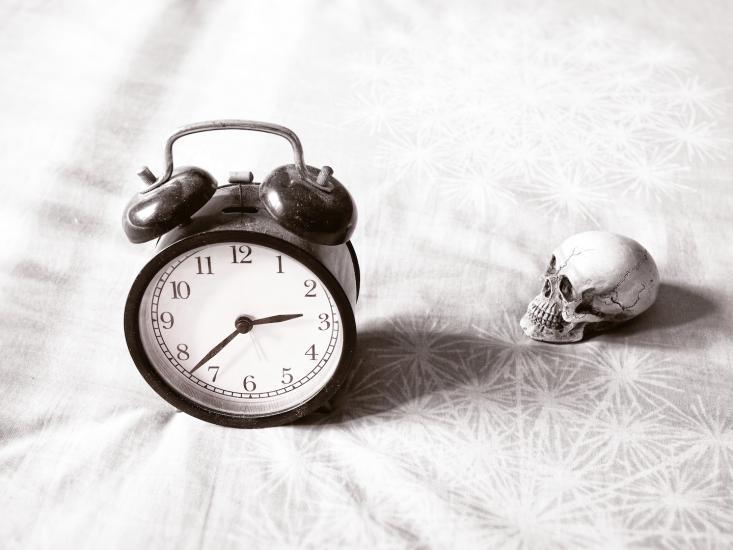Why do you need to correct sleep mode

Violation of the daily rhythm of the body associated with the flight through several time zones ( jetlag ) is not the only cause of fatigue. Ignoring your biological rhythms can lead to chronic fatigue, so much like a jet lag, that Till Roenneberg with his team at the University of Munich Ludwig-Maximilian in 2006 came up with the term “social jet lag”. It manifests itself in the discrepancy of your biological clock and social life. And he can be accused not only of fatigue, but also of many modern diseases.
In 2012, Roneberg and his colleagues studied over the sleep and wakefulness of more than 65,000 people. They found that 80% of working people use alarm clocks. The problem with them, according to chronobiologists , is that our own biological clock knows better when we need to wake up.
Unlike tough global clocks with time zones, which appeared as a result of the strong interconnection of parts of our world, our internal clocks are different not only for different people, but also for different periods of your life, when you go from childhood to adolescence, then to youth and then into adulthood. The contradictions between the internal, biological clock and external, social reach their peak at about 20 years. But this “tug of war” can affect everyone, from schoolchildren - whose school regime dictates the day - to pensioners. Sometimes people stay up late, sometimes not; use an alarm clock to get up early, or muffle it to sleep; spend the morning of the day off to sleep off a week, or not. As a result, a huge debt accumulates during sleep and an imbalance of the internal clock.
')
Each of us has a circadian clock, using approximately a 24-hour rhythm, synchronized with the change of light and darkness on the surface of the Earth. The retinal photosensitive cells send information to the daily corrective main brain clock. Basic clocks regulate system signals such as body temperature, eating behavior and fluctuation of hormone levels, which are then used by remote, peripheral cellular clocks throughout the body to fine-tune molecular paths and synchronize them with the main clocks. The resulting cyclical rhythms can be seen everywhere, from the behavior to the level of glucose in the blood. And when constant coordination begins to falter, phase differences between the main and peripheral clocks can manifest themselves in the form of chronic degenerative diseases.
Initially, scientists believed that these broken circadian clocks should primarily be manifested in night shifts, flight attendants and people who often fly on airplanes - those whose work leads to frequent and serious violations of sleep and wakefulness. But research shows that to some extent this affects us all.
In 2015, a group from the University of Pittsburgh showed that even people working during the day had a link between circadian rhythm disturbances and the risks of metabolic disorders leading to obesity, diabetes, and cardiovascular diseases. Ronneberg was not surprised. “From various epidemiological and experimental studies, we knew that metabolism — especially glucose / insulin metabolism — suffers from a lifestyle that does not coincide with the internal clock,” he said . Regularly changing the time of sleep, waking up and eating, we destroy the synchronization between the main and peripheral clocks. Instead of following the guidelines of the main clock, the latter follow the social regime, destroying the closely related and complex mechanisms of human physiology.
This is due to the fact that circadian rhythm disturbances spoil our microbiome - a set of bacteria in the intestine that help digest food. They can be influenced not only by diet, but also by meal times. The disruption of temporal rhythms also disrupts the rhythm of the microbiome, changing its structure and functioning, says Christoph Thaiss, an immunologist at the Weizman Institute in Israel. Chronic impairment can lead to an imbalance of metabolism, which in turn leads to the unbalance of glucose and obesity.
Violations of the internal clock are also associated with a large number of mental illnesses, such as Alzheimer's and Parkinson's. Studies claim that signs of the onset of these diseases, caused by the accumulation of certain proteins in the brain, may appear as a result of the disruption of the internal clock. Poor sleep, interrupted or short, in adults can lead to circadian rhythms, which, in turn, leads to the accumulation of toxic beta-amyloids - a known precursor of Alzheimer's disease.
There are concerns about the connection between circadian rhythms and cancer. Many studies in mice and humans have shown that disruption of circadian rhythms suppresses the genes responsible for suppressing the development of tumors, and at the same time stimulates mutations in other genes that can lead to the development of cancer. For this and other reasons, WHO in 2007 called night shifts carcinogenic.
These effects of the social jetla are a signal of the SOS, sent to change our habits about the time and duration of sleep. As long as our sleep mode is governed not by knowledge of the biological clock, but by the requirements of the social clock, physically and mentally, we will not be able to work at the peak of our abilities. The consequences of the frequent disruption of our watches - namely, the indiscriminate use of artificial lighting and the sleep time not related to Earth’s cycles - lead to disruptions in the body’s work that can cause many diseases.
It's time to adjust the social clock to our needs. To do this, first of all, it is necessary to recognize that a good dream is not a luxury, but a necessity, and it will benefit both our work and our relationship.
Source: https://habr.com/ru/post/403785/
All Articles